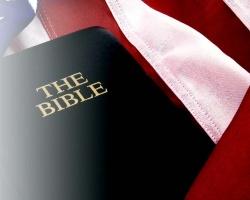As I write, America has three viable presidential candidates. By the time you read this, we should be down to two, having gone through a primary season that’s generated unprecedented interest in election-year politics.
Is there something in this wave for youth ministry to ride, or should we leave politics to the activists and pundits? Should politics even be on the youth ministry radar?
Throughout Scripture, God’s people were called to engage in the political landscape of their day. Joseph and Moses each engaged a Pharaoh. Daniel engaged Nebuchadnezzar. Esther engaged Xerxes. Paul, showing great political moxie, appealed to Caesar.
Scripture Text
The passages below are some of many verses connecting God’s people to their political surroundings. As you read them, focus on God’s instructions, along with the atmosphere we should create when interacting with our civic leaders.
1 Timothy 2:1-2, NIV
I urge, then, first of all, that requests, prayers, intercession and thanksgiving be made for everyone—2 for kings and all those in authority, that we may live peaceful and quiet lives in all godliness and holiness.
Remind the people to be subject to rulers and authorities, to be obedient, to be ready to do whatever is good, 2 to slander no one, to be peaceable and considerate, and to show true humility toward all men.
1 Peter 2:13-16, NIV
13 Submit yourselves for the Lord’s sake to every authority instituted among men: whether to the king, as the supreme authority, 14 or to governors, who are sent by him to punish those who do wrong and to commend those who do right. 15 For it is God’s will that by doing good you should silence the ignorant talk of foolish men. 16 Live as free men, but do not use your freedom as a cover-up for evil; live as servants of God.
Think About It
These passages make two things clear. One: Believers are meant to be politically engaged—or at the very least, aware. Interacting with secular leadership isn’t just for the activists. We’re to do good, a good that can be noticed by the ruling authorities. Tw We’re to be humble and respectful as we engage. To do otherwise would sully God’s reputation (
Apply It
The current historic rise in election interest creates an unusual opportunity for youth workers. It gives youth ministry an opening to help students consider the “civic duties” Scripture outlines, bringing cultural and political engagement into their spiritual periphery. Here are a few things we can do to spur this kind of engagement:
• Explore in detail with students people like Esther and Daniel. Look for how their actions and attitudes are replicated today’s political environment.
• Create ways for students to get acquainted with their closest elected official, such as a mayor, city-council person or township trustee.
• Encourage students to send letters of appreciation to their U.S. Representative and two U.S. Senators, letting them know they’re praying for them.
Political involvement on the part of God’s people may not rise to “Great Commission” status, but it is more important than we tend to make it. Arguably, political awareness could be as important to God as many of our spiritual disciplines.
Let’s use this year’s election excitement to search the Scriptures that might normally go unexplored and excite our students to become—at the very least—voters for life. Who knows, God may be calling them to much more.




